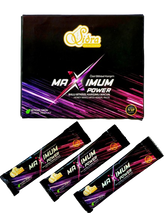Biotin Benefits, Uses, Side Effects, and More 2025 Guide
Biotin, also known as vitamin B7 or vitamin H, has become a popular biotin supplement in the health and beauty industry especially for those looking to improve hair, skin, and nail health. But what exactly is biotin, and what does it do for your body?
In this 2025 updated guide, we’ll break down everything you need to know about biotin its uses, dosage, benefits, side effects, and more.
What is Biotin?

Biotin is a water-soluble B-vitamin that plays a crucial role in metabolizing fats, carbohydrates, and proteins. It supports the health of your hair, skin, nails, nervous system, and more. Since the body doesn't store biotin, it’s important to get it from food or supplements regularly.
Top Biotin Benefits (2025 Updated)
These are the benefits of Biotin:
Promotes Healthy Hair Growth
One of the most well-known benefits of biotin is its ability to support hair health. It helps strengthen hair strands, reduce breakage, and improve shine. In 2025, biotin supplements continue to be widely used in hair care routines.
Improves Skin and Nail Health
Biotin can enhance the strength and texture of nails and may help reduce skin issues like dryness or rashes. People with brittle nails often notice improvement within weeks of taking a biotin supplement.
Boosts Metabolism
Biotin plays an essential role in converting food into energy. It helps enzymes break down carbohydrates, fats, and proteins, making it important for a healthy metabolism.
Supports Brain Function
Vitamin B7 supports cognitive health and the nervous system. A deficiency in biotin can lead to fatigue, mood swings, and difficulty concentrating.
May Help in Pregnancy
Biotin requirements increase during pregnancy. Many doctors recommend prenatal supplements that include biotin to support fetal development and maternal health.
Common Food Sources of Biotin
You can find natural biotin in foods such as:
-
Eggs (especially the yolk)
-
Almonds
-
Sweet potatoes
-
Spinach
-
Bananas
-
Salmon
-
Whole grains
Still, in some cases, a supplement might be necessary if your diet lacks these nutrients.
Who Needs Biotin Supplements?
While most people get enough biotin through a balanced diet, supplements are commonly used by:
-
People with hair thinning or hair loss
-
Those suffering from biotin deficiency
-
Pregnant women
-
Individuals recovering from long-term antibiotic use
-
People with conditions like diabetes, seborrheic dermatitis, or multiple sclerosis
If you’re considering a supplement, make sure to consult your doctor first.
Biotin Dosage How Much Should You Take?
In 2025, the standard biotin dosage recommendations remain:
-
Adults: 30 to 100 mcg per day
-
Pregnant women: 30 mcg
-
Breastfeeding women: 35 mcg
Many over-the-counter biotin supplements range from 1000 to 10,000 mcg, especially those aimed at improving hair and nails. High doses should only be taken if recommended by a health professional.
Biotin Side Effects What You Should Know

Biotin is generally safe when taken in recommended doses. However, high doses can cause some side effects or interfere with lab tests. Watch out for:
-
Skin rashes
-
Digestive upset
-
Interference with thyroid and heart test results
-
Acne outbreaks (especially with very high doses)
Always check with your healthcare provider before starting any supplement.
Where to Buy Biotin Supplements in Pakistan
If you're looking for authentic and high-quality biotin supplements, check out Taqatwar.pk – a reliable store offering top-rated health products and vitamins in Pakistan.
Conclusion
Biotin is a powerhouse vitamin when it comes to hair, skin, and overall health. In 2025, it remains a go-to supplement for people looking to improve their appearance and energy levels. While biotin can offer several benefits, it’s important to maintain a balanced diet and avoid megadoses unless prescribed.
If you're noticing symptoms of biotin deficiency or want to boost your beauty and wellness routine, a biotin supplement could be the right choice. Just make sure to go for a trusted source like Taqatwar.pk.


